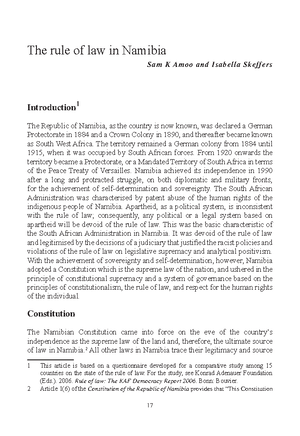- Information
- AI Chat
Was this document helpful?
Notes on Monist and Dualist States
Course: Introduction to Law (LJIL3510)
345 Documents
Students shared 345 documents in this course
University: University of Namibia
Was this document helpful?

Monist and Dualist
1
Monism
Monists hold that International Law and State Law share a common origin-
namely Law.
The scholars and followers of this theory is called Monists.
According to Monism, International Law is directly applicable in the National
legal order. There is no need for any Municipal implementing legislation;
International Law is immediately applicable within National legal systems unlike
Dualism, without any incorporation or transformation.
Monists hold that International Law and State Law share a common origin-
namely Law.
According to Monism, International Law is directly applicable in the National
legal order. There is no need for any Municipal implementing legislation;
International Law is immediately applicable within National legal systems unlike
Dualism, without any incorporation or transformation.
Monists hold that International Law and State Law share a common origin-
namely Law.
Monism II slightly different and is the latest and widely accepted theory of
Monism. Its emphasis on supremacy of International Law in the system. Though
both International and Municipal laws are laws and are applicable, Monism II
advances the idea that International Law principle are somewhat superior when
compared to Municipal Law.
It stresses on the fact that the International rules, takes precedence over
National legislation, and automatically repeal any National laws contrary to
them. This theory got squashed by the more sophisticated and realistic theory
of Triepel (Founder of the Theory of Dualism).
This theory according to Antonio Cassese, looked more like aspiration than a
description of reality.
Dualism
Dualism theory was developed by a German scholar Triepel and an Italian
scholar Anzilotti.
The important principle of Dualism is that, International Law and Municipal Law
are two separate and distinct orders, in their objects and spheres of operation,
such that the norms of one would not operate within the realm of the other
without a positive act of reception or transformation, as the case may be.
The International Law and Municipal Law are two entirely different things and
the International Law can never be applied in the state without incorporating or
transforming it into Municipal Law.
In Dualism, at no circumstances, the International Law can prevail over the
Municipal Law, and it is the Municipal Law which is always supreme.









